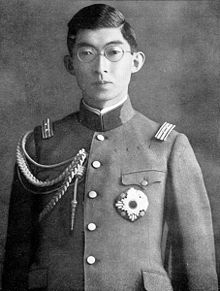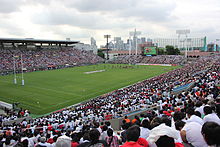Chichibu Yasuhito

Prince Chichibu Yasuhito ( Japanese 秩 父 宮 雍 仁 親王 Chichibu-no-miya Yasuhito-shinnō ; born June 25, 1902 in Tokyo as Atsu-no-miya Yasuhito-shinnō ; † January 4, 1953 in Fujisawa ) was the second son of Tennō Taishō and brother of Tennō Shōwa and thus a member of the Japanese imperial family . Like many other members of the Imperial House of the time, he was a general in the Imperial Japanese Army .
biography
Early life
Prince Chichibu was born on June 25, 1902 in the Aoyama Palace in Tokyo as the second son of the then Crown Prince Yoshihito (later Tennō Taishō) and his wife, Crown Princess Sadako . Its original name was Atsu-no-miya (Prince Atsu). He and his brother Hirohito (later Tennō Showa) were handed over to the care of the former officer Kawamura Sumiyoshi and his wife immediately after their birth , but returned to their parents after Kawamura's death in 1904. After his normal school education, Prince Atsu enrolled at the Central Military Preparatory School in 1917 and at the Imperial Japanese Army Academy in 1922 .
On May 26, 1922, Tennō Taishō gave Prince Atsu the title Chichibu-no-miya and allowed him to found a new branch of the Imperial Family. In 1925 the prince went to Great Britain and studied there in Oxford at Magdalen College . During his student days he was awarded the Royal Victorian Order by King George V and gained the reputation of an excellent mountaineer and nature boy. In January 1927 he returned to Japan after the death of his father, who had been physically and psychologically attacked for a long time, as he was the direct heir to the throne of the chrysanthemum until the birth of his nephew Akihito in December 1933.
marriage
On September 28, 1928, Prince Chichibu married Matsudaira Setsuko, the daughter of Matsudaira Tsuneo , the Japanese ambassador to the United States and later to the United Kingdom . Although she was theoretically born a commoner, her blood was considered noble because her paternal grandfather was the last daimyo of Aizu. The marriage remained childless, as the princess' only pregnancy resulted in a miscarriage.
Military career
Prince Chichibu had already graduated from the Army Officer's School in October 1922 with the rank of lieutenant and joined the Imperial Japanese Guard . After his promotion to first lieutenant in 1925, he was promoted to captain in 1930 after graduating from the Imperial Japanese Army College . He was promoted to major in August 1935 and received his first command at Hirosaki .
Some historians link it to the failed coup attempt on February 26, 1936 . To what extent and whether he was involved in its planning remains unclear, but he had clear sympathies for the putschists and favored the ban on what he saw as corrupt political parties and the establishment of a military dictatorship under the leadership of the Tennō. He was also known as a friend of the Kōdō-ha within the army. After the assassination of Prime Minister Inukai Tsuyoshi , he led many heated discussions with his brother, Tennō Hirohito, whether the constitution should be repealed and the Tennō should rule directly.
After the coup attempt, he and his wife were sent on a journey of several months through Europe. He represented Japan at the coronation of King George VI of England in May 1937 . at Westminster Abbey . He then traveled to Sweden and the Netherlands , before he finally alone after Germany came and there in Nuremberg at the Nazi Party took part of the 1937th He then met Adolf Hitler with whom he wanted to negotiate about intensifying German-Japanese relations . During a meal at Nuremberg Castle , Hitler was verbally very aggressive about Josef Stalin , which led the prince to say to his companion, Homma Masaharu : "Hitler is an actor, it will be difficult to trust him." Despite these doubts, the prince was still certain that Japan's future lay in an alliance with Nazi Germany, and he consulted with Hirohito frequently, especially in 1938 and 1939, about the possibility of entering into a military alliance with Germany against Great Britain and the USA.
During his stay in Europe, Prince Chichibu was given command of the 31st Infantry Regiment in August 1937, which was followed by his promotion to Lieutenant Colonel in 1938 and finally to Colonel in 1939. In the Second Sino-Japanese War , which had just broken out , he took part directly or indirectly in various battles. He was stationed in Manchuria during the Nomonhan incident and was moved to the city immediately after the Nanking massacre . On February 9, 1939, he received a memorandum on biological warfare from Ishii Shirō . As a result, he also took part in several demonstrative vivisections by Ishii.
Various books claim that Prince Chichibu was involved in Operation Kin no Yuri after the outbreak of the Pacific War , the task of which was to steal art from the conquered areas. This claim contradicts the official account made in the memoirs of Princess Chichibu. There it is stated that Prince Chichibu retired from active military service after contracting tuberculosis in June 1940, from which he did not recover, and spent the remainder of the war as major general without use at his home in Gotemba .
post war period
Prince Chichibu had shown considerable interest in sporting events, sport-based citizenship training and corresponding modernization projects since the 1910s, and attended international sporting events held in Japan such as the Far Eastern Championship Games of 1917, 1923 and 1930 and represented Japan. After the end of the Pacific War, Prince Chichibu became honorary chairman and supporter of many sports organizations, which earned him the nickname Sporty Prince . He took particular care of the promotion of rugby in Japan after the chairman of the Japan Rugby Union, Shigeru Kayama, had been able to inspire him for the sport.
After his death, the Tokyo rugby stadium was renamed the Prince Chichibu Rugby Stadium and a statue of the prince in rugby outfit was placed there.
The prince was also Honorary President of both the Japanese-British and Japanese-Swedish Societies.
death
Prince Chichibu died at his home in on January 4, 1953 Fujisawa to tuberculosis . His remains were burned and buried on January 12, 1953 in the Toshimagaoka Cemetery in Tokyo.
Web links
- Kunaicho | Their Imperial Highnesses Prince and Princess Chichibu
- Foreign News: Personable Prince , Time Magazine , Jan. 10, 1927
- Newspaper article about Chichibu Yasuhito in the 20th century press kit of the ZBW - Leibniz Information Center for Economics .
literature
- Princess Chichibu. The Silver Drum: A Japanese Imperial Memoir. Global Books Ltd. (UK) (May 1996). Trans. Dorothy Britton. ISBN 1-86034-004-0
- Peggy and Sterling Seagrave, Gold warriors: America'Secret Recovery of Yamashita's Gold , 2002
- Fujitani, T. Splendid Monarchy: Power and Pageantry in Modern Japan . University of California Press; Reprint edition (1998). ISBN 0-520-21371-8
- Lebra, Sugiyama Takie. Above the Clouds: Status Culture of the Modern Japanese Nobility . University of California Press (1995). ISBN 0-520-07602-8
- Scouting Round the World , John S. Wilson, first edition, Blandford Press 1959 p. 67
Remarks
- ↑ Peter Wetzler, Hirohito and War , University of Hawai'i press, 1998, p. 189
- ^ Sheldon Harris, Factories of Death , 2002, p. 142
- ^ Sheldon Harris, Japanese Biomedical Experimentation during the World War II Era , in Military Medical Ethics, volume 2, 2003, p. 469
- ^ P and S Seagrave, Gold warriors , 2002, The Yamato Dynasty , 1999
- ^ Princess Chichibu, The Silver Drum , Global Oriental, 1996
- ^ Stefan Huebner: Pan-Asian Sports and the Emergence of Modern Asia, 1913–1974. Singapore: NUS Press, 2016, Chapters 1-2.
- ^ Fran Cotton (Ed.): The Book of Rugby Disasters & Bizarre Records . Compiled by Chris Rhys. Century Publishing, London, 1984, ISBN 0-7126-0911-3 .
| personal data | |
|---|---|
| SURNAME | Chichibu, Yasuhito |
| ALTERNATIVE NAMES | 秩 父 宮 雍 仁 親王 (Japanese) |
| BRIEF DESCRIPTION | Japanese military, General of the Imperial Japanese Army, member of the Japanese Imperial House |
| DATE OF BIRTH | June 25, 1902 |
| PLACE OF BIRTH | Tokyo |
| DATE OF DEATH | 4th January 1953 |
| Place of death | Fujisawa |
